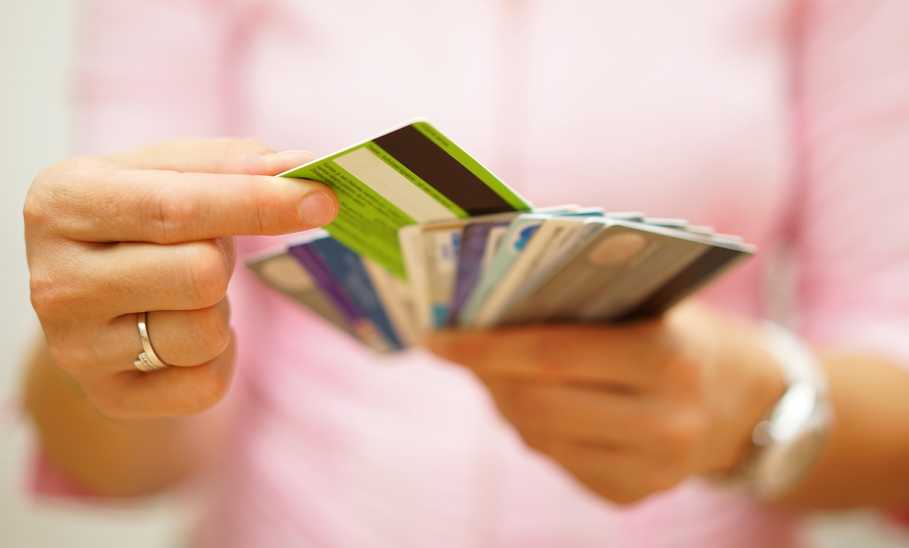How Many Credit Cards Should I Have?

Our evaluations and opinions are not influenced by our advertising relationships, but we may earn a commission from our partners’ links. This content is created by TIME Stamped, under TIME’s direction and produced in accordance with TIME’s editorial guidelines and overseen by TIME’s editorial staff. Learn more about it.
The right number of credit cards for one person could easily create a financial disaster for another. After all, some consumers easily juggle multiple cards and payments without racking up long-term debt, yet others with a single card wind up overspending, making late payments, or both.
If you're wondering how many credit cards you should personally have, the ideal number depends on how you manage your finances and what you hope to gain from more than one card.
What is the right number of credit cards for the average person? And, how do you decide on the best number for yourself? Read on to learn the pros and cons of having multiple cards instead of just one (or even none at all).
There's no specific formula that shows when someone has too many credit cards, and there may not even be a limit. The fact is, credit scoring models like FICO and VantageScore don't even consider how many credit cards you have when determining your credit score. Instead, scoring models focus on factors such as payment history and how much debt someone has in relation to their credit limits (also called credit utilization ratio).
Credit scoring models do consider how much "new credit" a person has, as well as the average length of their credit history. But, after someone has had multiple credit cards for a considerable stretch of time, these factors won't count against a person with multiple cards, either.
All this being said, there may be situations where a person has too few credit cards and their credit score suffers as a result. This is typically the case when consumers are first building their credit and they have minimal information listed on their credit reports. In that scenario, picking up another credit card or taking on another type of loan could help a person build up their credit profile—and their score—over time.
Credit aside, there are also personal factors to keep in mind when deciding on a number of credit cards. For example, consumers will want to think over how well they are able to keep track of multiple payments each month, and which benefits they get from several cards that they can't get from just one.
If someone has even one credit card and they struggle to make on-time payments, this can signal that even a single credit card is more than they can handle.
There are definitely upsides to having multiple credit cards when credit is used responsibly, but you have to weigh the risks against potential rewards. The table below shows some of the main advantages and disadvantages that come with having several credit cards instead of just one.
| Advantages of multiple credit cards | Downsides of multiple credit cards |
|---|---|
Better access to credit during an emergency | Potential to rack up more debt |
Strategic spending and card use can yield more rewards | Several monthly payments to keep track of each month |
Access more credit card perks and features | You may have to pay several credit card annual fees |
Earn several sign-up bonuses | Potential credit score impact |
Recent data from Experian shows the average consumer had around 4 credit cards at last count, and this number shouldn't surprise you. The fact is, today's best credit cards have so many perks and features that it makes sense for consumers to want to try them out over time.
The main benefits of having multiple credit cards can vary from person to person, and we explain them below.
Having multiple credit cards typically means having a higher credit limit overall. This can be a major help when emergency expenses hit. Maybe you find yourself with an unexpected car repair and have to settle the bill immediately to get your car out of the shop. Perhaps you lost your job and you need to be able to pay rent and utility bills until you get another gig lined up.
In either scenario, having multiple credit cards and limits you can use could help you stay financially afloat—at least in the short term.
Many consumers with several credit cards use them strategically to earn more rewards. As an example, some credit card rewards enthusiasts sign up for the Chase Sapphire Reserve®, Chase Freedom Unlimited®, and Ink Business Preferred® Credit Card in order to create the Chase trifecta.
This combination of cards is used to earn rewards on business spending with the Ink Business Preferred® Credit Card, more points on travel and dining purchases with the Chase Sapphire Reserve®, and then a base rate of at least 1.5% back on regular, non-bonus purchases made with the Chase Freedom Unlimited®.
Having done this, consumers pool all their rewards points into their Chase Sapphire Reserve® accounts in order to facilitate transfers to Chase airline and hotel partners and get 50% more value for travel booked through Chase.
It can also make sense to have several credit cards with different perks and features that don't overlap. For example, it's common for frequent flyers to have an airline credit card that helps them get free checked bags and priority boarding—but also use a combination of cash back credit cards and travel credit cards for their regular spending and bills.
Sometimes consumers sign up for specific cards in order to gain benefits like purchase protection and extended warranties. Then they strategically use those cards for major purchases they want those protections to apply to.
Most rewards credit cards also come with welcome bonuses you can earn when you meet a minimum spending threshold within a few months of account opening.
Obviously, opening multiple cards over time can help you earn multiple bonuses, which can help you increase the total amount in rewards you earn over time.
Having more than one credit card can be a major boon for a person's financial life, but this is really only the case when credit is used wisely and responsibly. There are definitely situations where even one card is too many, as well as issues that come with trying to juggle multiple credit cards at once.
According to Experian, average credit card debt across American consumers increased 13.2% to $5,910 in 2022. In the meantime, the total number of credit card accounts across American households increased to 526.2 million in 2022, up 31.7 million from the year before.
The fact is, having credit cards makes it easier to overspend and can lead to surging balances. This is true whether a person has one credit card or several, but having multiple credit cards makes it easier for debt to spiral out of control.
In addition to the potential to rack up more debt, having multiple credit cards means having several balances and payment due dates to keep track of throughout the month. This can spell disaster for people who struggle to keep track of bills, especially since payment history is the most important factor used to determine FICO scores and VantageScore credit scores.
In some cases, it's much easier for people to have a single credit card bill to manage and pay each month.
Rewards enthusiasts who sign up for the best credit cards on the market today may also wind up juggling several credit card annual fees at once. These fees can be well worth it if someone is getting rewards and perks that are worth more than they pay in, but there are situations where multiple annual fees don't necessarily yield more benefits in the end.
This is often the case when consumers pay several annual fees for cards with overlapping benefits. For example, many premium credit cards with high annual fees come with perks like airport lounge access and a fee credit for Global Entry or TSA PreCheck membership, and it can be a losing proposition to pay annual fees for redundant benefits like these.
Applying for too many credit cards in a short amount of time can damage your credit score, especially in the short term. This is because each credit card application results in a hard inquiry on the person's credit report, and this information is used to rate consumers based on the amount of new credit they have.
Having several credit cards also increases the chance of making a late payment, and this single factor is the most important determinant of both FICO credit scores and VantageScore scores.
If you're wondering how you can settle into the right number of credit cards for your lifestyle, consider these tips and how they might apply to your situation.
Ask yourself what you hope to gain from having one credit card or multiple cards. If you want to maximize rewards over the course of a year, having several credit cards with different rewards structures can make a lot of sense. Of course, you can also earn credit card sign-up bonuses with each new credit card you sign up for, and this can play a role in your decision, too.
If you really just want to earn cash back, however, having a single credit card with the best cash back rate you can find could help you simplify your finances. If you only want a credit card for emergencies, that's another reason having just one card could make sense.
Maybe you want a second or third credit card with a 0% APR balance transfer offer so you can consolidate debt from your other cards and pay it down without interest over time. At the end of the day, you'll want to determine what your goals are and how many credit cards you actually need to reach them.
Next, you'll want to be extremely honest with yourself when it comes to your own ability to manage multiple cards and payments. Do you have what it takes to track your spending across multiple accounts and make on-time payments on all your cards every single month?
If you have struggled with debt and late payments in the past, it's possible you should limit yourself to a single credit card or even no credit cards for regular use. If you have a long history of on-time payments and minimal debt to speak of, on the other hand, having multiple accounts at once may be a non-issue.
Whichever number of credit cards you decide on, we don't suggest rushing into your plan all at once. Applying for too many new credit cards can cause temporary damage to your credit score in the "new credit" category for starters. It can also decrease the average length of your credit history overnight.
It's better to space out new credit applications over the span of several months, or even years, if you can. Taking the time to add new cards slowly can also help you get into a routine when it comes to monitoring multiple accounts and making sure all your payments are made on time.
If you have considered all the factors at hand and you know you want more than one credit card in your wallet, there are strategies you can use to get the most out of the experience. Consider the following:
If you're worried that having multiple cards will make it difficult to track your spending, make it a point to check in on your balances at least once per week. This is especially important if you're using different rewards credit cards for bonus category spending, and if you want to ensure your overall spending hasn't increased due to having multiple accounts.
You can even pay your credit cards off completely multiple times throughout the month. Doing so can help you maximize credit as part of a monthly budget and spending plan, and it can ensure your balances don't balloon when you're not paying attention.
If you're not worried about overspending but you just want to make sure you don't forget about payments, try marking your payment due dates for each card on your calendar. Many credit card issuers also let you set up email or text reminders that let you know when payments are due, and these reminders can be incredibly useful.
While you should strive to pay your credit card bills in full each month to avoid interest, setting up each of your cards on auto-pay for at least the minimum payment is a good backstop. This ensures you'll never miss a payment if you forget to pay your bill.
Finally, consider using a budgeting app—or even a written budget—to stay on track with your credit card spending and other bills. Doing so can help you figure out where your money is going each month, and it can help you ensure you're using credit cards wisely and to your advantage.
How many credit cards should you have? That really depends on what you want out of credit cards in the first place, and whether you have what it takes to avoid late payments and debt over time.
Before you decide on the right number of credit cards for your wallet, think long and hard about your personal financial situation and what you can handle. Having more than one credit card can help you earn more rewards and perks over time, but there are risks to consider, too.
You can apply for several credit cards at once. However, card issuers that see you just applied for another account may deny your application.
There are no major downsides that come with not using a credit card account you have access to. In fact, stashing an unused card in a drawer instead of canceling it can actually help your credit score by increasing the average length of your credit history.
If you're dealing with credit card debt and trying to find the best way to pay it off, there are several different strategies to consider. Some experts recommend using a strategy called the "debt snowball" to pay down smaller balances first, whereas others recommend using the "debt avalanche" to pay down debts with the highest interest rates first.
Whichever strategy you choose, you'll get out of debt faster if you stop using credit cards for new purchases during the process.
Having several credit cards can help build credit faster since you're having multiple payments reported to the credit bureaus each month. However, multiple cards can only help your credit if you make payments on time and keep your credit utilization ratio in an acceptable range.
You can have several business credit cards or just one, and the choice is really up to you. Many business owners opt to have multiple business credit cards so they can take advantage of different credit card perks and maximize the rewards they earn over time.
If you are considering a secured credit card so you can build credit quickly, you should pick the best one and move forward. After all, you'll have to put down a security deposit as collateral for the card, and there's no reason to pay multiple security deposits if you don't have to.
Whether you're building credit from scratch or just trying to add depth to your credit reports, having one credit card may be enough. To get the most out of one credit card or several, you'll want to make on-time payments and keep debt at a minimum. Most experts recommend keeping your credit utilization ratio at 30% of your available credit limits or below for the best results.
College students are better off starting their credit journey with a single student credit card at first. This gives them the chance to learn positive credit habits over time, and to make sure they can avoid debt and make on-time payments before graduating to multiple cards.
The information presented here is created by TIME Stamped and overseen by TIME editorial staff. To learn more, see our About Us page.



